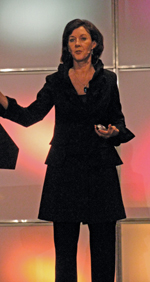|
WHO
 Kathleen
Bartholomew, R.N., was the
featured speaker at the Feb. 29
medical center's Leadership
Development Institute. She has
been a national speaker for the
nursing profession for the past
nine years and author of several
books, including "Ending Nurse to
Nurse Hostility: Why Nurses Eat
Their Young and Each Other." In
2010 she was nominated by Health
Leaders Media as one of the top 20
people changing health care in
America. Bartholomew first
encountered physician bad behavior
as a new nurse in the early 1990s.
Bartholomew said it's more
critical than ever to teach
managers and employees how to
create a culture of understanding
and security in the work place,
especially given statistics that
show the huge costs of bullying
and aggression in health care. Kathleen
Bartholomew, R.N., was the
featured speaker at the Feb. 29
medical center's Leadership
Development Institute. She has
been a national speaker for the
nursing profession for the past
nine years and author of several
books, including "Ending Nurse to
Nurse Hostility: Why Nurses Eat
Their Young and Each Other." In
2010 she was nominated by Health
Leaders Media as one of the top 20
people changing health care in
America. Bartholomew first
encountered physician bad behavior
as a new nurse in the early 1990s.
Bartholomew said it's more
critical than ever to teach
managers and employees how to
create a culture of understanding
and security in the work place,
especially given statistics that
show the huge costs of bullying
and aggression in health care.
Tribal
Formations
Bartholomew recommended switching
from a hierarchical way of
managing to a tribal one where
employees feel safe and valued. 
HIERARCHY
--Staff complain to manager or
each other
--Boss solves problems
--People know their place
--No feedback sought
--Secrecy and blame
--Control as key
--Different rules for different
roles
TRIBE
--Staff take accountability
--Staff seek resolution
--People know their value
--Peer evaluations
--Just culture – open sharing
--Relationships as key
--100 percent of staff held to
same standard
The consequences
Rude
behaviors left unchecked can
lead to high turnover, low
morale and medical errors. One
study found the verbal abuse
from physicians was reported at
90 to 97 percent; 76 percent
witnessed negative
nurse-to-nurse behaviors and 67
percent saw a link between those
behaviors and medical errors.
(Rosenstein).
Among a
survey of Washington state ER
nurses, it led to:
- Withholding
information, 45 percent
- Ordered
to do work below competence,
40 percent
- Opinions
and views ignored, 33 percent
- Pressure
not to claim something, 28
percent
- Key
areas of responsibility
removed, 27 percent
- Being
ignored or excluded, 25
percent (JONA Vol. 39 No. 2)
Strategies to Cope
There are
many strategies that can help
reduce the amount of bullying
happening in the work place.
Managers can decrease
negativity, gossip and a culture
of blame by maintaining a zero
tolerance for communication that
is unhealthy, she said. The
following is a questionnaire
designed to open up a dialogue.
Sample
questionnaire managers can
use:
I am
respected by my peers 1 2 3 4 5
I feel supported by my peers 1 2
3 4 5
I can safely express my opinions
1 2 3 4 5
I feel a strong sense of
belonging 1 2 3 4 5
What I like the most about my
team is:
What I need more from this team
is:
Behaviors to Seek
Professional
behaviors include: Accept one's
fair share of the workload, keep
confidences; work cooperatively,
despite feelings of dislike;
look co-workers in the eye;
don't engage in conversation
about a coworker; stand up for
an "absent member" in
conversations so you don't
become a silent witness; don't
be overly inquisitive about each
other's lives; and do repay
debts, favors and compliments.
Contact Info
Dowload
handouts at http://mcintranet.musc.edu/muscexcellence/LDI/LDI21.htm.
For more information, visit http://www.kathleenbartholomew.com.
|



 Kathleen
Bartholomew, R.N., was the
featured speaker at the Feb. 29
medical center's Leadership
Development Institute. She has
been a national speaker for the
nursing profession for the past
nine years and author of several
books, including "Ending Nurse to
Nurse Hostility: Why Nurses Eat
Their Young and Each Other." In
2010 she was nominated by Health
Leaders Media as one of the top 20
people changing health care in
America. Bartholomew first
encountered physician bad behavior
as a new nurse in the early 1990s.
Bartholomew said it's more
critical than ever to teach
managers and employees how to
create a culture of understanding
and security in the work place,
especially given statistics that
show the huge costs of bullying
and aggression in health care.
Kathleen
Bartholomew, R.N., was the
featured speaker at the Feb. 29
medical center's Leadership
Development Institute. She has
been a national speaker for the
nursing profession for the past
nine years and author of several
books, including "Ending Nurse to
Nurse Hostility: Why Nurses Eat
Their Young and Each Other." In
2010 she was nominated by Health
Leaders Media as one of the top 20
people changing health care in
America. Bartholomew first
encountered physician bad behavior
as a new nurse in the early 1990s.
Bartholomew said it's more
critical than ever to teach
managers and employees how to
create a culture of understanding
and security in the work place,
especially given statistics that
show the huge costs of bullying
and aggression in health care.